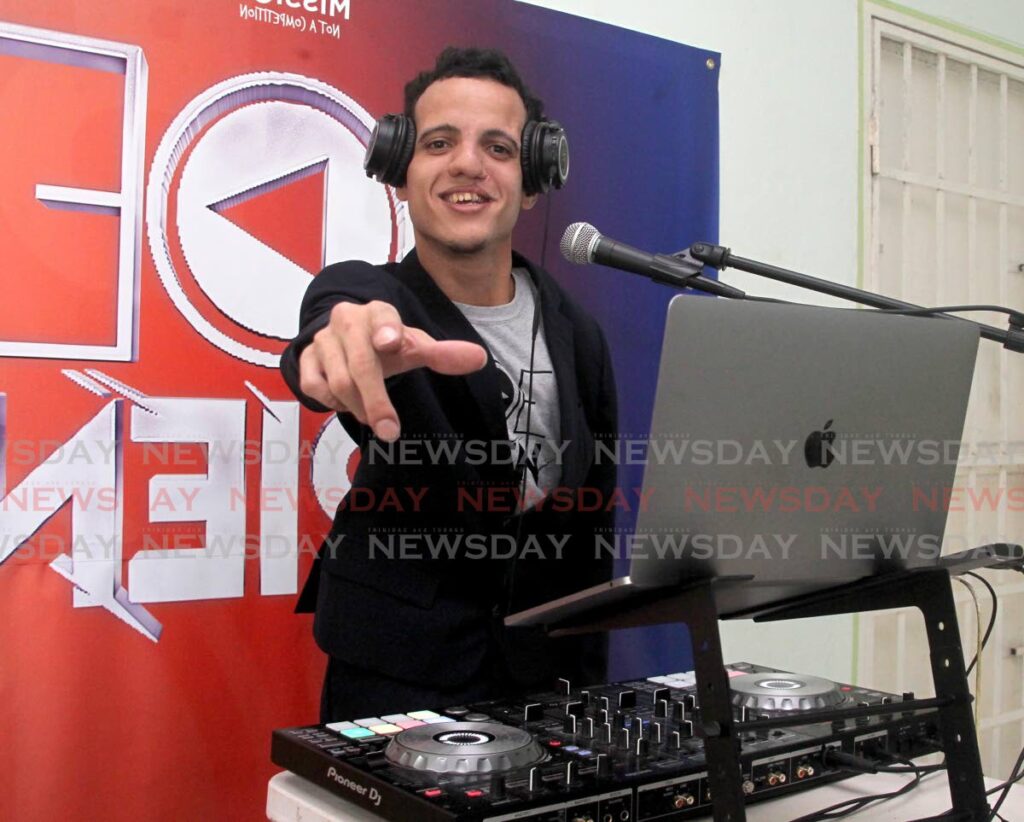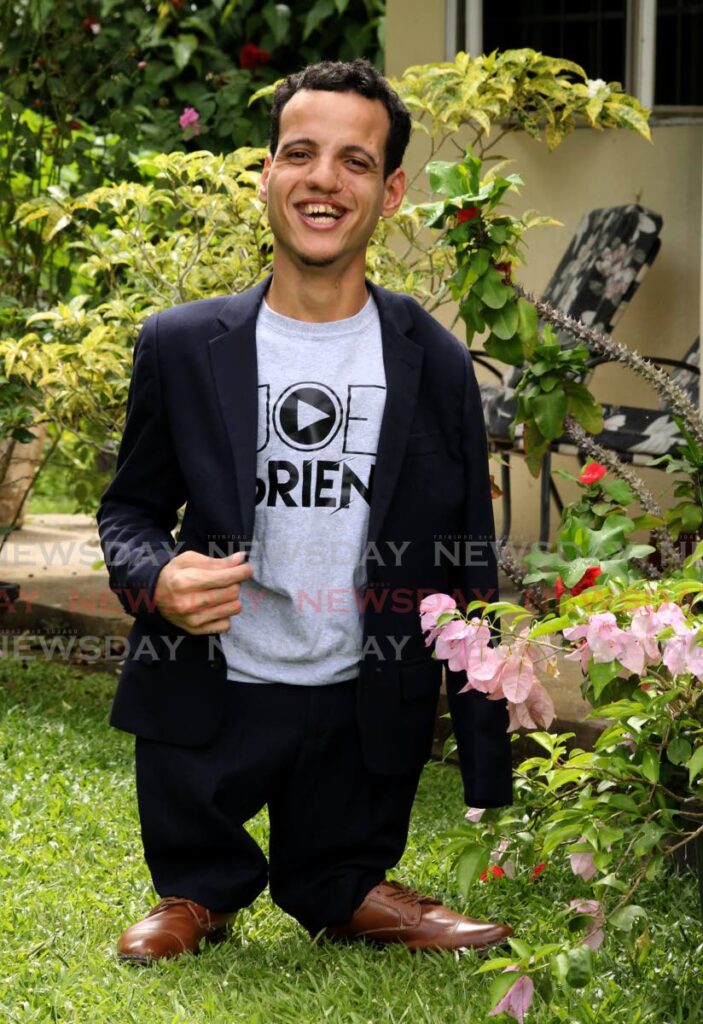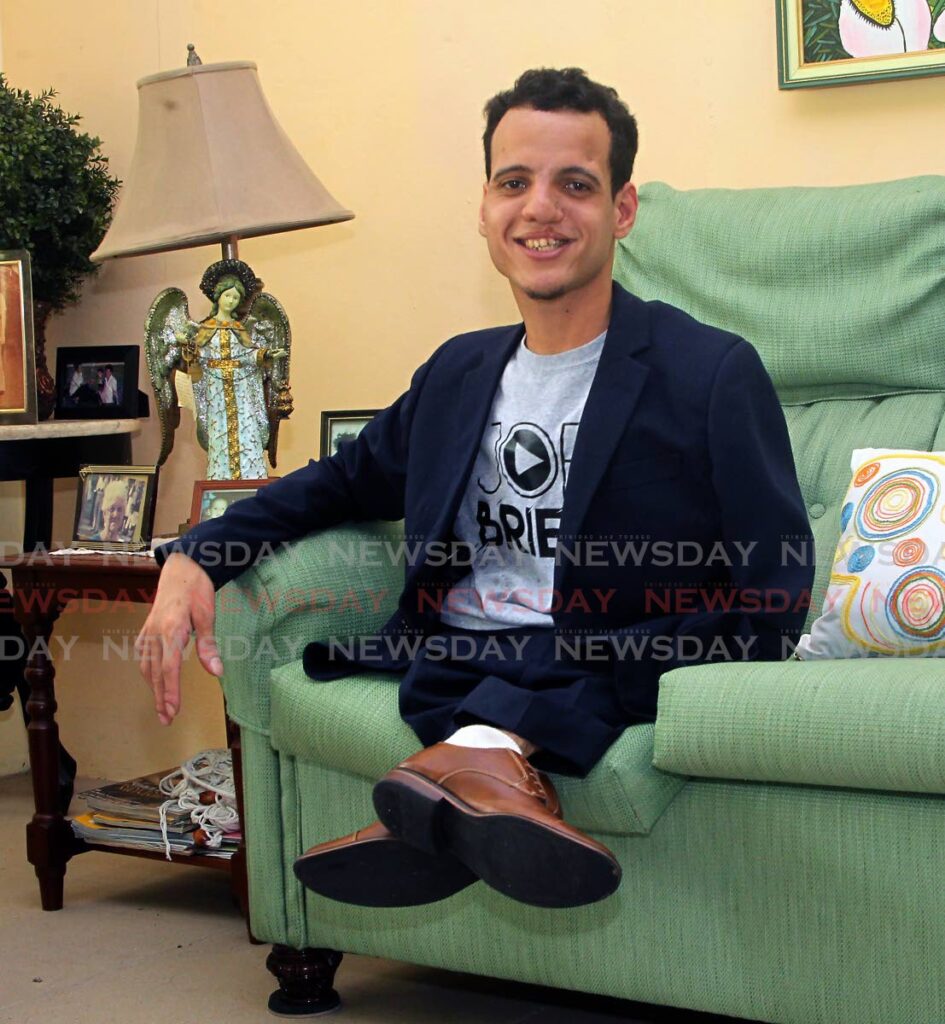DJ Joe O'Brien taking music to another level

Even though positive strides have been made toward an all-inclusive society for disabled people, one physically-challenged man believes TT has more to accomplish.
Joseph O’Brien, also known as DJ Joe O’Brien, spoke with Sunday Newsday about his difficulties and those the community faces daily.
The 26-year-old is the eldest of five siblings but currently lives with his grandmother and aunt and currently lives in Maracas Valley, Joseph.
He was born with proximal femoral focal deficiency (pffd), which affects the upper part of the femur bone that causes one leg to be shorter than the other and could include other bone and muscle disorders such as malrotation, limb-length discrepancies, fibular hemimelia, joint instability and muscle weakness.
O’Brien is 105 centimetres tall, with no left arm and has a cleft lip and palate. At the age of ten, he underwent surgery for scoliosis.
Some of his most disturbing memories would have been in primary school because of ostracisation by some of the school’s administrative staff.
He did not name the school but explained it was difficult and used the negative experiences over the years as motivation and positive reinforcement to get through each day.
“There was an incident where I got injured in the courtyard. I was later prevented from going out to play, they also encouraged my classmates to discriminate against me.”
O’Brien said his days at his high school, Fatima College, were much different and where he was welcomed by everyone. There he found purpose and understood that despite his physical differences, he was a functioning person and citizen in society.
As the years passed, he said, he encountered people during his commutes who expressed an interest in his condition but being a shy person, he never engaged in much conversation.

- PHOTO BY ROGER JACOB
It was a conversation with a woman, a stranger, O’Brien said, that showed him that listening to others and sharing his story would be that flicker of hope that someone needed.
“I came across a woman who seemed to be severely depressed and she told me her life was not good because of problems with her family and finances. Then she asked, 'Joseph wouldn’t you like to live in a world where you could be happy all the time?' I was shocked. I was never asked that question before.
“I responded, no. The bad times help you appreciate the good times. That was when I realised a lot of people were not able to learn as fast as I did because of my condition. So, I looked at it as a chance to share what I’ve learnt to help someone.”
O’Brien recalled his daily struggle to get to his job every day at radio station, Boom Champions 94.1fm in Port of Spain, using public transportation. Because it was uncomfortable, inconvenient and complicated to move around the city he had to fork out additional money to arrange for personalised transport.
He explained a recent trip to Port of Spain, in which he was not able to make alternative transportation arrangements, has showed more than ever challenges that disabled people faced with getting around.
“I had to walk through Port of Spain because it is inconvenient and hard to use a wheelchair and I almost collapsed. A stranger approached me and offered a ride, which I gladly accepted because I had no choice.”
“I believe that people are generally sensitised now about helping people like me and understand the ups and downs that we face. And while there were some positive changes, we have a long way to go.

“Accessing services were also difficult, for example, bus passes were available, but I have to physically go to collect it, which again is inconvenient and difficult because of a lack of infrastructure to allow movement.”
O’Brien called for government, civil society organisations and corporations to get more involved to create a more inclusive society for the disabled and physically-challenged community.
He explained that they do not want handouts and one-off interventions, but rather an enabling environment that would allow them to work and contribute to the development of themselves and society.
Disabled people, O’Brien said, should not be pushed into a corner, because there were many people with skill sets that should be utilised, and most people wanted to work.
“There needs to be more dialogue to a place where people set their biases and feelings aside in order to address the situation head-on that could bring meaningful and feasible solutions. Infrastructure is one area that does not cater for people with physical challenges.
“Services are set up in such a way that if we collect disability grants, we cannot work and if we choose to work, we cannot have access to those grants. Yes, we have an income if we work, but we don’t have the infrastructure to allow us easy movement and now have to find additional money to get around.”
O’Brien said generally, the public has been understanding and has noticed a positive change in interactions and a helping hand.
He urged people, despite the challenges, to pursue their dreams, even if it seemed far-fetched as his own experience has presented opportunities that have surpassed what he imagined.
“To become a DJ was a lifelong dream, it was love at first sight. I started university and was pursuing a double major in French and Spanish but eventually dropped out. Being a DJ was what I wanted to do and decided to make this my profession.
“I set my goals and realised the more hours I dedicate and invest into the craft, eventually I will be successful and be at the place I wanted to be.”
At the age of 20, O’Brien took it upon himself to learn the artform and was later informally coached by his neighbour, who was also a DJ. It was through this interaction he was exposed to other DJs and soon after found himself getting small gigs. His first gig was at a small neighbourhood bar.
“I never got any formal training at the start but was able to learn from my neighbour who introduced me to others and was later exposed to different techniques which I used to become better.”
O’Brien was the house DJ at Coco Lounge for some time and played at Ocean’s Lounge and Cabana Lounge at other intervals in his career, he also had several gigs at various entertainment venues in Miami.
He started working at the radio station when the covid19 pandemic and health regulations halted the operations of entertainment clubs. It's been eight months since being with Boom Champions 94.1fm and O’Brien said it has been a memorable experience.
“I am greatly appreciative that the programme manager and staff made accommodations for me at the workplace. The inclusion of steps in the studio so that I could reach the turntables, seating and other infrastructure for mobility were provided.”
His favourite genre of music is soca, which he described was as the “crème de la crème” of music and enjoyed introducing people to it.
O’Brien said one of his greatest achievements to date was competing a DJ battle held in St Vincent and the Grenadines where DJ’s from across the Caribbean competed.
“There were the big names in the business and the smaller ones there. It was exciting because people initially judged me on my appearance, and this gave me a chance to show that there were no limitations to what a person can do. I won that battle.”
O’Brien was hopeful for more international exposure and said his recent mixed tape submission to the radio Triple J in Australia was one way of building his portfolio and career and to also expose people to soca and TT.


Comments
"DJ Joe O’Brien taking music to another level"